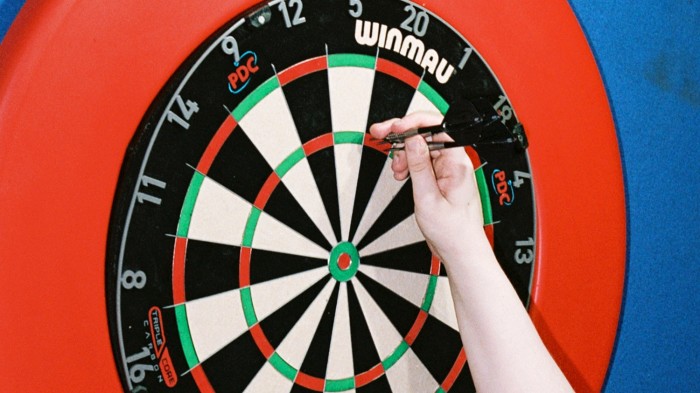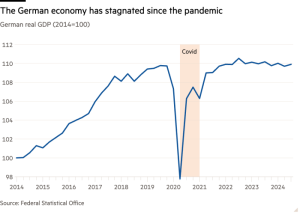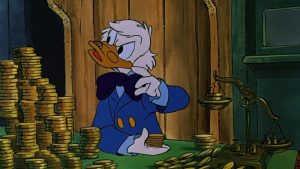State of the dart — how a boozy hobby became a global phenomenon

The hero of the story is a 17-year-old boy. Raised in Warrington, north-west England, he likes kebabs, video games and Manchester United Football Club. He’s a normal teenager, cheeky as they often are. But, above all, he knows how to play darts.
The world came to know Luke Littler at the end of 2023. A string of surprise wins allowed him to qualify for the World Darts Championship, the most prestigious event in the sport’s calendar. Viewers watched intently as Littler, then 16 but suspiciously old for his years, beat a succession of darts legends. He thrashed a po-faced Matt Campbell, Canada’s number one. He knocked out his childhood hero, 57-year-old Dutchman Raymond van Barneveld. With every win, another naughty smile. “Who wants to see me get another kebab!?” he cried out to his new fans. More than one million people now follow him on Instagram.



The teenager met his match in British player Luke Humphries, in a final watched by 4.8 million people — the highest Sky Sports has seen for a non-football event. Both will take part in this year’s World Championship at Alexandra Palace next week: odds-on the record is broken again.
Littler is just the cherry on a cake the Professional Darts Corporation (PDC) has been baking for decades, however, part of a drive to bring in new audiences and build players from the ground up. What was once considered a boozy hobby is now a global enterprise and a rightfully respected sport. In 2023, viewing figures for the World Championship were up by more than 33 per cent; the year prior, they increased by almost half. Affiliated tours have launched in Australia, Scandinavia, North America, Africa and Asia, although England remains the motherland (darts as we know it started in British pubs). Bigger sponsors have allowed the annual prize fund to more than double in the past decade, creating more incentive for players to play well. “Some of the best darts you will ever see are being thrown right now,” says darts historian Patrick Chaplin.
Five months after his famous debut, Littler is at London’s O2 Arena for the Premier League Darts play-offs. Also in the running are former world champion Michael Smith, reigning Premier League champion Michael van Gerwen and Humphries. All stand to win £275,000, the second-biggest prize of the season. The stadium’s backstage area is packed with reporters, punters and news outlets. Most of them are here for Littler, who has even been filming for children’s TV channel CBeebies. I find him eating a supermarket sandwich in his dressing room, for once looking like a normal teenager.




“I don’t really look at who the favourite is — I just try and win,” a pink-cheeked Littler says to his lunch. In person the player has none of his on-stage bravado. He has earned hundreds of thousands worth of prize money over the past few months, but still considers himself to be “the same person” — he only pines for a Volkswagen Golf.
At the other end of the spectrum is 35-year-old Dutchman van Gerwen, who has adult braces, a bald head and all the braggadocio you’d expect from winning the Premier League seven times. “Don’t take too long,” he barks at the beginning of our slot; his primary concern is thinking about how to “smash ’em”. Even his management team are told to “piss off” (but hang around politely). Does he have many friends in the tournament? “I’m a loner,” he says.
By 7pm The O2 is pumping with chants and oddly dressed fans; since the early 2000s, silly outfits have apparently been requisite, though no one seems to know why. There are young men in banana suits, Mario costumes and monk robes. “Oy, oy, oy!” they coo. There are also numbers of women, families and couples. All fumble happily into the arena, which is dotted with “180” signs — the highest score you can earn in a single turn. To win, two players take it in turns — three darts at a time — to amass 501 points exactly. The winners of the two semi-finals tonight are the first to do this 10 times. For the final, it’s the first to 11.



It’s the evening everyone hopes for: Littler knocks out Smith; Humphries beats van Gerwen. The remaining two players begin a polite fight to the death: Littler wins the first two legs; Humphries takes the next two. So on, so darts. But in a moment that makes an elderly man jump out of his chair, Littler scores 180 twice in a row. To close the leg perfectly — known as a nine-darter — he needs to score 60 (he does), then 57 and, finally, a 24. The roof blows off. Littler sails through the last few legs, and the world number one is beaten by a boy who can’t legally order a pint.
But this is darts, a game in which anything can happen. “Anyone in the top 32 can beat each other,” says British player Nathan Aspinall, currently ranked seventh globally. Winning comes down to “whoever’s got the grit between their teeth that week”. Humphries, who almost quit the sport after a mid-game anxiety attack in 2019, says the game is “80 per cent mental, 20 per cent natural ability”. “That’s the difference between the elite league players and the players who are close to being elite,” he says.
The Premier League Darts play-offs drew in a record crowd of 14,000 fans, the final event in a 16-week run that — despite a 10 per cent price hike this year — sold 99.1 per cent of tickets. While Littler has no doubt expanded the audience, the party-going appeal is also obvious; add four proficient players to that atmosphere, and it’s even more compelling. “The world is not a particularly pleasant place,” says Matchroom founder Barry Hearn. “When you go to the darts, you forget all that. You have your chants. You have a drink. But the key element is that you’re watching brilliance.”




Hearn, who was the PDC’s chairman for 20 years and could sell ice to polar bears, is widely credited with transforming the sport. The 76-year-old is enjoying his semi-retirement with regular games of golf — “I don’t get busy, darling” — but is as passionate about darts as he was two decades ago. (He still serves as the PDC’s president, but it’s more of an advisory role.) Hearn describes being invited to Circus Tavern, the original home of the World Championship, in the late ’90s: “600 people having a pint, a cigarette, a terrible pizza.” To anyone else it might’ve looked like “fat blokes throwing darts”. To Hearn, it was a pot of gold.
The issue Hearn faced was changing how the sport was perceived. “Certain people looked down their noses — they missed the point,” he says. The first thing he did was work on “narrative”, creating nicknames for players and introducing walk-ons to involve the crowd. But the difference from other sports was that the players — what Hearn calls the “crème de la crème” — were “ordinary people”. And these are people now earning millions. “The weakness of the Olympics,” he says, “is that it doesn’t change lives other than make you famous for five minutes. You can’t eat a gold medal — you’ll break your bloody teeth. What you’ve got to do is get out there and make some cash, change your life, create a legacy.”


Littler, who started playing darts when he was two years old, trained at St Helens Darts Academy, part of an increasing number of youth clubs around the country. Academy founder Karl Holden, who also owns a darts shop in the town, says attendance has increased threefold in the past two years. As for the shop, 90 per cent of trade originally came from “people who played darts in pubs”; now Holden sees four times as many children coming for full set-ups, some of whom have Bentleys waiting outside. He recently bumped into Littler at a retail park in Warrington; there was a 500-person queue waiting for him. “You see that with football superstars; you don’t see it with darts.”
You might ask where all the women are. As it stands, 128 PDC players can compete in professional tournaments: all of them are men. Events are open to both sexes, but women haven’t had much luck qualifying. A Women’s Series was created in 2020 “for serious female players who wanted a women-only environment”, says PDC chief executive Matthew Porter, but admits that it’s “probably not the top female players of today who will be the major beneficiaries”. “As women, we’re kind of 10 years back — [darts] was always seen as a man’s sport,” says Buckinghamshire-born Fallon Sherrock, who narrowly missed out on qualifying this year. “It’s slowly getting there.”
In mid-July, the gang is back together in Blackpool for the Betfred World Matchplay, a nine-day event at the Winter Gardens. By Sunday, only Humphries and van Gerwen are left in the competition: Littler was knocked out by van Gerwen on day three. It’s the beginning of a bad run for Littler that will continue until November, when he wins the Grand Slam of Darts, a feat that makes him a millionaire. Still, the competition is exciting. “You hope he’s going to win because he’s so good,” says Chaplin. “But you won’t be disappointed if he’s beaten.”
There is also controversy in the women’s half of the competition. As one of the few transgender players in the sport, Dutch player Noa-Lynn van Leuven has experienced abuse from fans — and players — questioning her right to play in the Women’s Series. Van Leuven finishes fifth at the World Matchplay, but will be back for the World Championships.



The World Matchplay is not the most prestigious event in the calendar — total prize money is £800,000 — but it’s one of the most historic. Blackpool has been home to the tournament since its inception in 1994. “Ask 100 dart players what their favourite event is; 99 of them will say the World Matchplay,” says Porter. “It’s got that heritage and history, that little bit of throwback darts.” Under the gilded ceiling of the Winter Gardens — also home to Blackpool’s historic ballroom dancing scene — fans of all different ages scribble messages on signs. The theme tonight is apparently Hawaiian, but there are also Shreks, sequin cowboy hats and an entire family dressed as hockey players.
The game starts off evenly. But when Humphries is at eight legs to his opponent’s six — first to 18 wins — van Gerwen fluffs an easy opportunity to close the gap. Here is where the mental games come into play. Every time Humphries wins a leg, the Dutchman responds by pummelling the board crossly, appearing to cry “bullshit” when he misses. “He’s fuming,” says a man in an Oompa-Loompa costume, shaking his head. Van Gerwen equalises, but it isn’t enough; Humphries beats him by three legs.
Dusk has fallen when people start shuffling out of the Winter Gardens. The atmosphere is completely free from tension. A couple of older women in novelty T-shirts walk past clutching takeaway pints. “What’s the plan now?” asks one. “Get pissed,” says the other. The crowd have their favourites, but it’s all about technical excellence. As Hearn concludes: “No one hates anyone in darts.”
#State #dart #boozy #hobby #global #phenomenon








